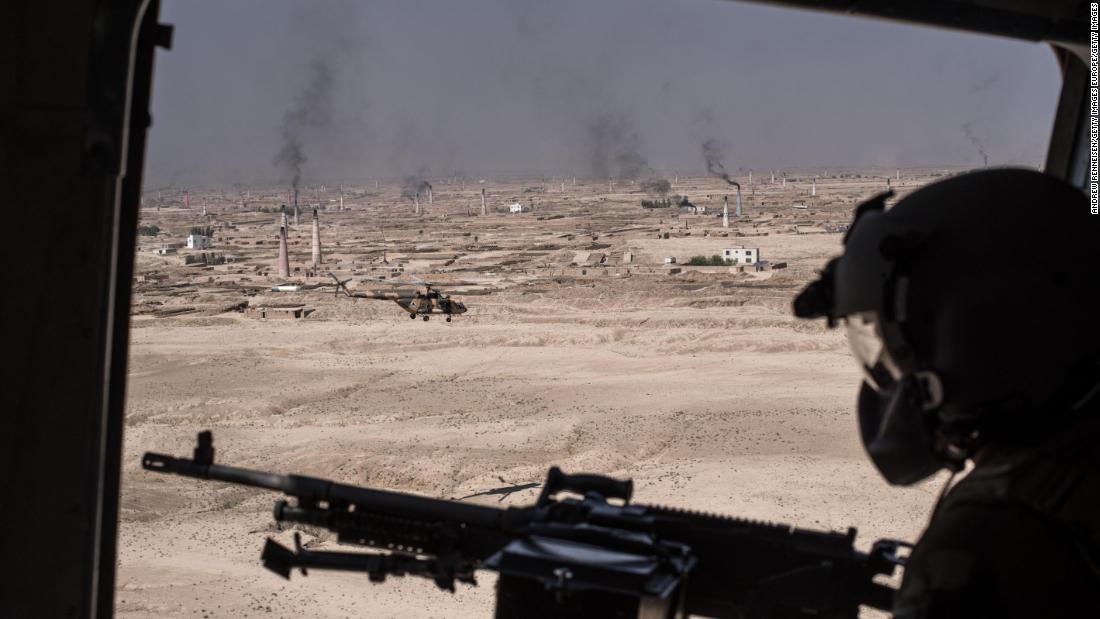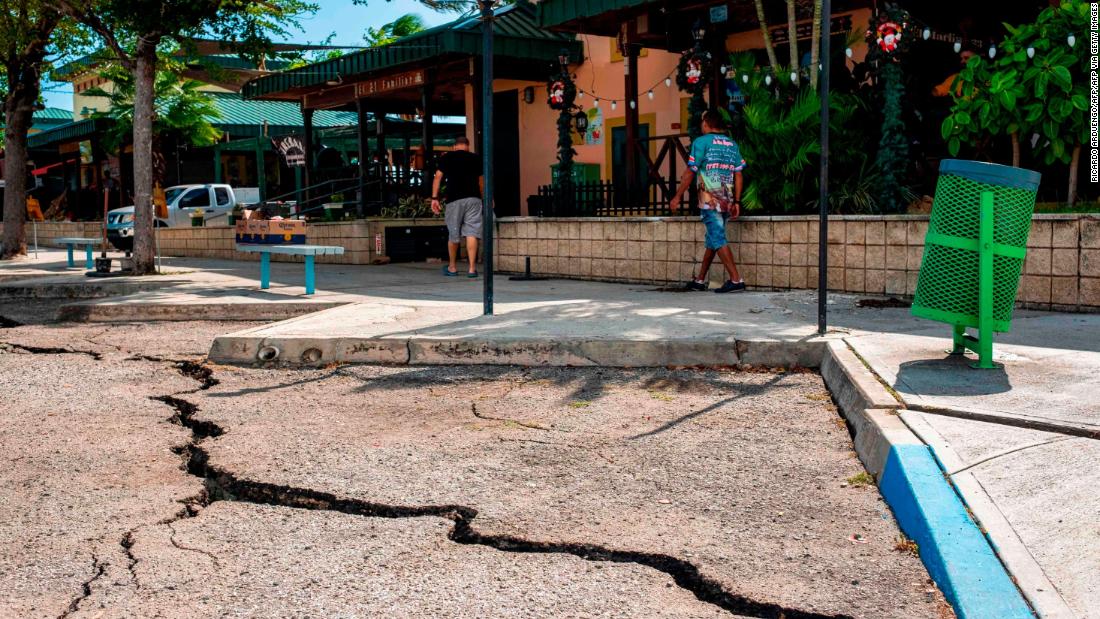Ukraine is demanding a full investigation and compensation for the victims -- mostly Iranian, Canadian and Ukrainian -- who died when the airliner was shot out of the sky, hours after Iran launched a number of missiles at two bases housing US troops in Iraq.
Now what? How are the families of the passengers and crew compensated for this unbearable loss? And how do US and Iranian government leaders, now in direct and open military confrontation for the first time since Iran's Islamic Revolution, map a route out of this crisis?
There are still many unanswered questions about the evidence of "imminent and sinister attacks" against Americans that led the US to kill General Qasem Soleimani last week. Republican senators, Mike Lee and Rand Paul, joined Democrats complaining about the Trump administration's briefing to Congress. Lee called it: "The worst briefing I've seen -- at least on a military issue -- in my nine years."
Congress also wants to know whether Soleimani was
targeting four US embassies before he was killed, as Trump told Fox News on Friday. It will also seek to find out if the US's aim was broader. On the same day the US killed Soleimani in Baghdad, it tried
unsuccessfully to kill another senior Iranian military official in Yemen.
In the meantime, the latest
USA Today poll since these hostilities started, say Americans do not feel safer since Iran's top general was killed.
The poll found that 55% of Americans say the killing of Soleimani makes the US less safe, while 57% oppose the threat of US airstrikes on Iran's cultural sites and 53% support Congress limiting Trump's ability to order military strikes. Elsewhere, anti-Americanism has soared around the world since Trump took office, according to
new Pew research published Wednesday.
The US's European and NATO allies do not support Trump's latest strikes on Iran, nor pulling out of the Iran nuclear deal. It's notable that Germany's Angela Merkel went to Moscow Saturday to visit Russian President Vladimir Putin to try to defuse the current crisis. She did not go to Washington.
So, is the crisis between Iran and the US over? No, it is not.
President Donald Trump has announced a new raft of sanctions against Iran. He said in his address Wednesday that, "the US will immediately impose additional punishing economic sanctions ... these powerful sanctions will remain until Iran changes its behavior. In recent months alone, Iran has seized ships in international waters, fired an unprovoked strike on Saudi Arabia and shot down two American drones."
He called on Europe and Russia and the rest of the world to pull out of the Iran nuclear deal, while also calling on them to join him in making a new deal with Iran.
"We must all work together toward making a deal with Iran that makes the world a safer and more peaceful place," Trump said. "We also must make a deal that allows Iran to thrive and prosper, and take advantage of its enormous untapped potential."
The extraordinary direct military confrontation between the US and Iran may be over for now, but Iranian leaders are pushing their longtime political agenda.
In his televised address on Wednesday, Iran's Supreme Leader Ayatollah Ali Khamenei insisted: "Military action this way, that's not sufficient. What matters is that the presence of America ... that should come to an end."
And the more moderate President Hassan Rouhani, who was elected in 2013 on his promise to negotiate with the US and improve Iran's relations with the world, backed up Khamenei's message in his
own tweet.
Also on Wednesday, in his address to the nation, Trump made remarks that seemed to indicate he too was looking for ways to reduce the US military presence in the region.
"Today I am going to ask NATO to become much more involved in the Middle East process ... America has achieved energy independence ... We are independent and we do not need Middle East oil," he said.
What message does that send to America's Gulf allies, like the United Arab Emirates and Saudi Arabia who depend on the US's military umbrella? As a precaution, they are dialing down their hostility and dialing up their diplomatic overtures to Iran.
US Defense Secretary Mark Esper had told me that the US wanted to deescalate the crisis.
"We are not looking to start a war with Iran, but we are prepared to finish one. As I've told my many colleagues ... over the last few days, what we would like to see is the situation de-escalated and for Iran to sit down with us to begin a discussion about a better way ahead. We think that's the best approach at this point in time."
While America's allies -- and even its adversaries -- caution against starting another war in the Middle East, it is difficult to see where the opening for discussion, negotiation and a diplomatic solution is right now.
On Tuesday, Secretary of State Mike Pompeo insisted that the Trump administration's policy would be to confront and contain Iran, but these can be two competing ideas.
Either you confront or you contain, Democratic Congresswoman Elissa Slotkin told me. Slotkin, an expert on Shia militias, served three tours of duty alongside US forces in Iraq as a CIA analyst.
She also warned that unless the Trump administration draws up a proper diplomatic strategy, war could still be an accidental consequence of its actions.
"I don't actually question the Secretary of Defense, or even the President's intent that they don't want to get into a war," she told me. "But most wars are not intended.
"Most wars, you get this tit-for-tat that goes in this spiral, and then suddenly each side has its back up and you can't back down, and you inadvertently fall into war," she said.
"I think we are at very high risk of doing right now. So, it's not just about intent. It's our actions mean something beyond our control," Slotkin said.
So what happens now that the President seems to have doubled down on his "maximum pressure" policy against Iran and continues to enforce harsh sanctions?
Iran has called past rounds of sanctions "economic terrorism," and "economic warfare" by the US ever since Trump pulled out of the nuclear deal with Iran, known as the Joint Comprehensive Plan of Action (JCPOA.)
Former military and government officials tell me that US intelligence had predicted last year that Iran would react to sanctions by attacking shipping in the Gulf and oil facilities in Saudi Arabia. The attacks happened but Iran denied any involvement. The sources believe the violence is unlikely to end if the Trump administration policies remain the same.
It is clear from Pompeo's statements after Soleimani's killing that he and the Trump administration are continuing to push for a popular uprising against the Islamic Republic. In other words, they're angling for regime change, despite publicly saying it is not their aim.
Whatever the administration's goal, the millions pouring onto the streets of Iran for four straight days of national mourning this week in the wake of Soleimani's killing, have demonstrated what Iranian Vice President for Women and Family Affairs Massoumeh Ebtekar told me: "This is a very clear indication of the response of the Iranian nation and the fact that the presence of the people, the huge crowds are staggering.
"And even for us -- we've been taking part in many of these marches and demonstrations from the beginning of the revolution -- this is something else. From one city to another city, it is a resurrection," she said.
"It's a revival of the Islamic Revolution," she added. "It's a revival of the Iranian nation."
One top US source and former military commander told me that -- for now -- the Trump administration has united the Iranian nation around an unpopular regime.
However, on Saturday there were protests in Tehran against the government after Iran admitted responsibility for the Ukrainian plane crash. Chants of "resignation is not enough, the responsible must be tried" and "IRGC, resignation, resignation. Leave the power," were raised.
But as for Esper's contention that the US wants "Iran to sit down with us to begin a discussion about a better way ahead." How is that likely to be received?
Iranian Vice President Ebtekar says reformists like herself, Mohammad Javad Zarif and Rouhani, have been burned on that front too, by Trump pulling out of the JCPOA.
By doing so, she says, he "gave the message that the American government is not looking for peace and security, is not looking for a multilateral resolution ... The time for negotiations has passed, unfortunately."
It remains to be seen whether diplomacy can and will be resumed in the future, whether the US-led fight against ISIS will continue in Iraq and Syria, and whether Iraq itself will become a new battlefield where Iran and Russia, will be the winners.
The Speaker of Iraq's Parliament said the country's government must condemn both US and Iranian military action there, and refuse "to allow the conflicting parties to try to use the Iraqi arena to settle their scores."
By week's end the Iraqi government was again insisting the US should make preparations to withdraw forces from their country, which was Soleimani and Iran's ultimate goal.
Of course, the US killing of Soleimani could end up deterring Iran and setting the table for a win-win diplomatic solution for a better future. It's just hard to see that from here.
https://news.google.com/__i/rss/rd/articles/CBMiU2h0dHBzOi8vd3d3LmNubi5jb20vMjAyMC8wMS8xMS9taWRkbGVlYXN0L2lyYW4tdXMtYW5hbHlzaXMtYW1hbnBvdXItaW50bC9pbmRleC5odG1s0gFXaHR0cHM6Ly9hbXAuY25uLmNvbS9jbm4vMjAyMC8wMS8xMS9taWRkbGVlYXN0L2lyYW4tdXMtYW5hbHlzaXMtYW1hbnBvdXItaW50bC9pbmRleC5odG1s?oc=5








